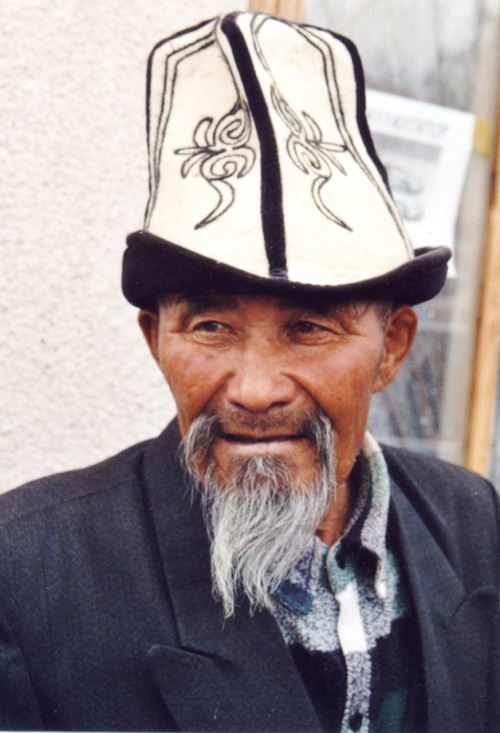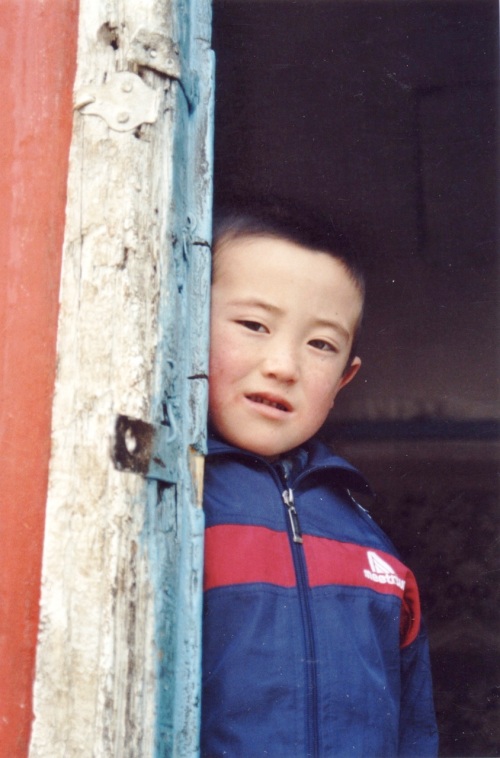Kyrgyzstan
Published Jan/Feb, 2008 in Transitions Abroad Magazine
Land of Snow Peaks, Grazing Herds and Unbridled Hospitality

With luggage and camping equipment firmly tightened on top, and kitchen utensils and supplies stuffed in boxes under the seats inside, the old Russian army truck with which we will follow the Silk Route through Kyrgyzstan, is ready to take off. The crew, a friendly English speaking guide and her three colleagues – two drivers and a cook who only speak Kyrgyz and Russian -, occupy the drivers’ cabin, while the rest of the expedition members have the rather basic, tight, and spring-less seats in the truck itself. Contact with the cabin can be made by pushing a button in case we need an emergency stop.
Only independent since 1991, after the collapse of the Soviet Union by whom the country was ruled for decades before, Kyrgyzstan’s infrastructure and public services are clearly still in its infancy. Bad road conditions in the mountains (which cover 90% of the country), no regular connections and proper means of transportation, no hotels and reliable power supply outside the major cities. The lack of any luxury is quickly forgotten, though, as the immense natural, unspoiled beauty of the country has us soon glued to our windows. The mountain ranges with their snow-capped peaks, glaciers and lakes are as breathtaking as the pristine forests and vast alpine meadows where herds of sheep, yaks, and horses are grazing, watched by a lone shepherd and his dogs. Here and there, small encampments of traditional yurts or intriguing graveyards add some contrast to the huge, scarcely populated plateaus.

At lunchtime, the cook conjures up a delicious buffet of salads, breads, cheeses, and fruits along the roadside. At night, the truck ploughs through barren land to reach a lake, a river, or a mountain stream close to which camp is set up. The small tents that our Kyrgyz travel company provides are easily put up at night and dismantled again next morning, and their sleeping bags are adequate enough for the already cold October nights. The foam mattresses are a bit on the thin side, however, especially for the uneven terrains we are sleeping on most of the time. But alas, who really cares when the scenery is magnificent and tasty dinners like besh barmak (lamb and noodles) or plov (rice and meat) are accompanied by plenty of local wodka, a glowing campfire and melancholic Russian songs?
One day, when it has been raining cats and dogs for hours on end and any improvement in the sky does not seem imminent, we reach a little village by the time dusk sets in. The truck pulls up at one of the biggest dwellings to ask for lodging for the night, and the suddenly invaded family gets immediately and collectively into action. Two rooms are vacated; mattresses, sheets and blankets are pulled from a big armoire; and after providing us with tea and home-made bread, they all disappear discretely to give space to our cook with her own kitchen utensils and provisions. Of course, everything is pretty basic: eating and sleeping on the floor, washing with icecold water from a bucket outside, and squatting amidst livestock next to the farm because at night the out-house is just too far out in the soggy field. But the kindness and hospitality of our hosts and their neighbours with whom we meet the next day is so heart-warming, that this easily outweighs the little inconveniences. They offer us kumyz, the famous fermented mare’s milk, as well as a yoghurt-like concoction called ayran, we are invited into their modest brick houses where we speak the language of gestures with mothers and their often shy but curious off-spring, and shepherds lend us their horses to ride on stony mountain paths.

No trip through the Kyrgyz Republic is complete without spending a night in a traditional yurta, a big grey-ish coloured tent with a dome-shaped roof, and with walls and floors covered with carpets of felt and fur. The Kyrgyz were traditionally nomads and would migrate seasonally with all their lifestock, households, and yurts to greener pastures and milder temperatures. Nowadays, many mountain-dwelling families still live in these easily movable dwellings during the summer months in order to let their horses, goats, and sheep graze in the vast alpine valleys, close to water sources. We can have a taste of this nomadic lifestyle during our last and coldest night in Kyrgyzstan, on our way to Kashgar, China.
At about 100 km distance from the snow-covered Torugart Pass, next to the famous Tash Rabat Caravanserai (a 15th-century stopping post for the Silk Road trading caravans, monks, and other travellers to protect them from snow storms and robbers), built in a mountain slope at an altitude of 3300 mtr., a camp of five yurts accommodates us. By lifting an ornamented curtain covering the doorway, we have access to a warm and cozy space inside. Richly elaborated covers, blankets, and pillows in cheerful colours, all woven and embroidered by local women, are piled up against the felt walls. Seated on thick carpets on the floor, we warm ourselves at the iron stove in the center. A stove pipe funnels the smoke out through a wooden hole in the top of the yurt, the tunduk (now represented on the national flag out of respect for their nomadic culture), which can easily be opened and closed with long lassoos that are attached to each corner.There, slowly dozing off after a rich meal and a firm night cap, it is good sleeping under the many covers and in the crisp high mountain air.

The next morning we have to leave at the crack of dawn, in still freezing temperatures, to be able to reach the Chinese frontier before closing time. As we bid farewell to our crew in the green army truck, and set foot on the other side of the border, we already miss the Kyrgyz’ land and its people, even despite the alluring prospect of a comfortabel hotel bed and a hot shower in a few hours down the road.
General Information
- Population: 5.2 million inhabitants; 64.6% urban, 35.4% rural
- Major languages: Kyrgyz and Russian
- Main source of income: agriculture
- Bordering countries: Uzbekistan, Tajikistan, Kazakhstan, China
- Currency: som (1 US = 41 soms). ATM in Bishkek only
- Major religions: Islam, Russian Orthodox
- Climate: cold winters, dry and hot summers (although nights can be cold, especially at higher elevations). Little rain, mostly in April. First snow in the mountains: September. June to Sept.; for bird-watching: June
- International dialling code: 996; Bishkek (capital and seat of government): 312
How to Get There
- Various airline companies, including British Airways, Turkish Airlines, Lufthansa, KLM, Uzbekistan Airways, Air Astana, Pakistan Airlines, Aeroflot, and Iran Air have connections to Bishkek, either directly or via a stopover in Baku or Almaty.
- Taxis from Bishkek’s Manas airport charge about 500 som for a ride downtown, but if you book your return ticket with them, it is only half the price. Several hotels ( Hyatt, Silk Road Lodge for example) offer shuttle services.
- A tourist visa is necessary and can be obtained from a Kyrgyz Embassy or Consulate. A letter of invitation may sometimes be needed. Passports should be valid for at least 6 months after entry.
Addresses
The following Kyrgyz companies, all committed to sustainable tourism, offer programmes in one, more, or all of these activities: Silk Road tours in off-road vehicles, trekking, mounteneering, camping, horse-back riding, camel trekking, (mountain) biking, hunting/ fishing, white-water rafting, kayaking, heli-skiing, helicopter flights, botanical tours, caving, bird-watching, yurt tours, cultural tours, entomological tours, and textile and felt tours.
- Horizon Travel, 118 Mahatma Gandhi St., 720014 Bishkek, tel. 640106 or 645147, www.horizon.elcat.kg
- The Celestial Mountains Tour Company, 131-2 Kievskaya, Bishkek, tel. 212562, www.celestial.com.kg
- Novinomad, 28 T. Moldo St., 720001 Bishkek, tel. 622381, www.novinomad.com
- Doshtuck Trekking, 42-1 Igemberdieva St., 720005 Bishkek, tel. 545455, www.dostuck.com.kg
- Alltournative, 107 Kievskaya, 720001 Bishkek, tel. 611330, www.alltournative.kg
Where to Stay in Bishkek
- Asia Mountains, 1a Lineinaya St., tel. 694075. Double: $45
- Dostuk, 429 b Frunze St., tel. 284251. Double:$95
- Silk Road Lodge, 229 Abdumomunova St., tel. 661129. Double: $100
- Hyatt Hotel, 191 Sovetskaya St., tel 661234. Double:$175
- Family-run accomodations ($10-$20 p.p.), apartments ($30 – $40 p.d.), or yurts ($7 – $15 p.p.) can be arranged through travel companies
N.B. All prices are quoted in US dollars
Where to Eat in Bishkek
- Dasmia (Asian), 2 Gorky St., tel. 530649
- Bombay (Indian), 110 Chuy Prospektisi, tel. 625115
- Yusa (Turkish), 14 Logvinenko St., tel. 623837
- Four Seasons (European), 116a Tynystanov St., tel. 621548
- Cyclone (European), 136 Chuy Prospektisi, tel. 212866
Filed under: articles | 1 Comment
Tags: silk road, soviet, trek
Loved this story. Really would like to see Kyrgystan, and I wondered about the company you used for this Silk Road trip by truck. Also enjoyed your story on travelling alone–I do a lot of the same things.